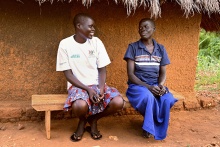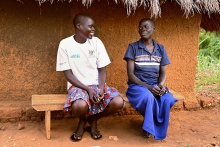Uganda hosts 1,644,870 refugees today, and nearly 56 per cent of them have come from South Sudan, fleeing conflict and hunger. Globally, nearly half of all people forced to flee are women and girls, carrying untold stories of resilience and unseen potential. Often, the communities they escape to are also poor. Yet, they persevere, dream and break barriers in search for a better life. On World Refugee Day, meet three women who broke stereotypes and are inspiring others to do the same.
Breaking barriers, building futures – a second chance for women refugees and the communities that host them in Uganda
Poni Grace dreams of building her own house
Poni Grace was only 16 years old when she had to leave the only home she knew as conflict erupted in Yei, South Sudan. After a perilous journey, she and her family arrived in the Imvempi Refugee Settlement in Terego district of Uganda, where resources were scarce and opportunities seemed elusive. “Life was difficult,” shared Poni. “My family lacked basic needs. We had no way to earn an income. Imvempi is rocky, and even when you farm, the yields are poor.”
A year after arriving in the refugee settlement, Poni got married, hoping for stability and support from her husband, only to be abandoned later. Poni had to fend for herself and her two children. When she heard about the UN Women-sponsored Second Chance Education and Skills Training programme, Poni didn’t think twice. Her choice of training surprised others – bricklaying – which is usually a man’s job. People criticised her, but Poni was unperturbed. “I chose bricklaying and masonry because it earns more money than the other opportunities,” she explained.
The UN Women training programme, funded by the Government of Japan, was a turning point in her life. Today Poni is one of the few refugee women working as a mason and bricklayer in construction sites. Her workmanship is valued, and she is known for her punctuality. She earns enough to take care of herself and her children; she has joined a Village Savings and Loans group where she saves at least USD 7 every week, building a safety net.
Now, Poni Grace has a new dream – “I have constructed my own house, and my children are studying in better schools.”
Annet Luka says there’s no trade that is exclusive to men
“There is no trade that is exclusively reserved for men. What men and boys can do, girls can also do,” says Annet Luka. She is the only woman carpenter of the Omugo II refugee settlement in Adjumani district, Uganda.
Annet Luka lost her father when she was only five years old. Shortly after that, conflict in her village in South Sudan forced her family to flee to Uganda. “One of the biggest hurdles I faced was accessing education,” said Annet. “While my mother managed to support me through primary and secondary school, I had four other siblings and there wasn’t enough to support all of us.” Annet dropped out of school because her mother couldn’t afford the fees.
In January 2024, she learned about training opportunities for refugee women and girls through UN Women’s leadership programme funded by the Government of Norway. “There were a number of courses being offered, and I decided to enroll in carpentry,” explained Annet. “I chose carpentry because it’s not affected by the seasons, making it a reliable source of income.”
“Many girls in my community shy away from carpentry, believing it’s only for men. Even my mother initially disapproved,” she recalled. But Annet managed to convince her mother and made some furniture for home. “Now we have a bench to sit on as a family, something we didn’t have before.”
An astute entrepreneur, she believes that being the only woman carpenter gives her an edge for a business. She dreams of starting her own carpentry workshop and train other women and girls.
“By empowering more women in carpentry, we can work together to challenge the stereotypes and build successful careers,” she says.
From subsistence farming to making windows – Veronica Konga will not give up
Veronica Konga escaped an abusive marriage with two children. She walked for an hour every day to access a plot of land where she did subsistence farming to feed herself and her children. Making ends meet was a daily struggle.
In 2023, Veronica found a glimmer of hope in a UN Women project that would benefit refugees and host communities in Adjumani district, Uganda, and train them in vocational skills.
Adjumani hosts more than 13 per cent of Uganda’s total refugee population but faces economic challenges. Uganda’s progressive refugee policy ensures that host communities like Veronica’s aren’t left behind, thus fostering social cohesion.
Veronica chose to learn metal fabrication, not a common choice for women in the community, but she was pragmatic and astute. “There is money in metal fabrication, and a ready market,” she explained.
The impact was immediate. Even before completing the training programme, Veronica made and sold her first product – a pair of windows. The income allowed her to get medical care for her sick child.
Veronica’s struggles are far from over. In a community where access to electricity remains a luxury, the dream of starting her own business in metal work, which requires electricity, faces some hurdles. The use of generators as an alternative power source is expensive.
But now Veronica has hope, and a vision for something bigger. “I look forward to perfecting my trade,” she says, determined to start her own workshop and mentoring other women to break stereotypes and forge ahead.
UN Women’s Leadership Empowerment Access and Protection (LEAP) programme funded mainly by the Government of Norway and Japan, is running in refugee settlements in Adjumani, Terego, Yumbe, and Kyegegwa in Uganda. The programme aims to ensure that Uganda’s humanitarian and refugee response is gender-responsive and women have increased access to leadership and livelihood opportunities, in addition to protection services. Since 2022, through the “Second Chance Education” component of the LEAP programme, at least 793 women and girls have received skills training.

